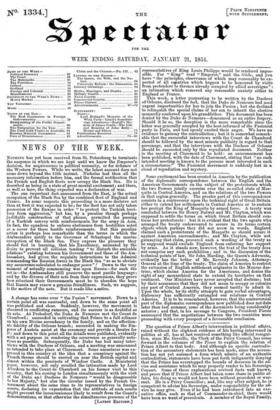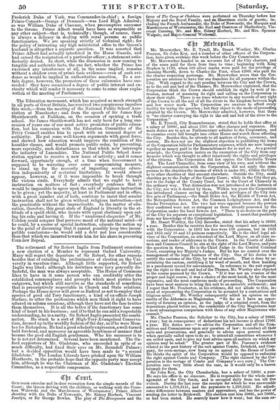The question of Prince Albert's intervention in political affairs, raised
without the slightest evidence of his having intervened in politics at all, has at last received something like official recogni- tion, since Mr. Greville, the Clerk of the Privy Council, has come forward in the columns of the Times to explain the relation of Prince Albert to that body. And although no specific contradic- tion of the accusatory statements has been made, since the accusa- tion has not yet assumed a form which admits of an authentic contradiction, statements have been put forth indignantly denying that the Prince has overstepped the bounds of decorum in the ad- vice and assistance which lie may properly render to his Sovereign Consort. Some of these explanations revived facts well known, and prove that if Prince Albert had taken some share in public af- fairs, his doing so would not have been without .precedent or war- rant. He is a Privy Councillor ; and, like any other subject, he is competent to advise his Sovereign, under responsibility for the ad- vice he may give. Even if he had been introduced into an exe- cutive office, such as that of Commander-in-chief, there would have been no want of precedents. A member of the Royal Family,
Frederick Duke of York, was Commander-in-chief ; a foreign Prince-Consort--George of Denmark—was Lord High Admiral ; so was William Duke of Clarence, when. presumptive successor to the throne. Prince Albert would have been as responsible as any other subject—that is, technically ; though, of course, there is always a delicacy in dealing with royal persons as public functionaries. We are speaking strictly of technical right; for the policy of intrusting any high ministerial office to the Queen's husband is altogether a separate question. It was asserted that Prince Albert had actually interfered in the Horse Guards, and had caused the resignation of a particular officer; a statement satis- factorily denied. In short, while the discussion is now coming to tangible and authentic facts, the one fact, whether the Prince has exercised any interference at all, in the sense implied, remains without a shadow even of prim& facie evidence—even of such evi- dence as would be implied in authoritative assertion. To a cer- tain degree, however, the promoters of these calumnies have suc- ceeded : they have occasioned a degree of public interest and cu- riosity which will render it necessary to come to some clear expla- nation at the meeting of Parliament.



































